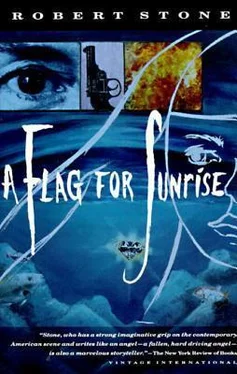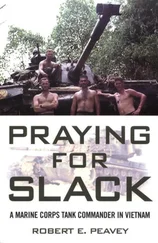Robert Stone - A Flag for Sunrise
Здесь есть возможность читать онлайн «Robert Stone - A Flag for Sunrise» весь текст электронной книги совершенно бесплатно (целиком полную версию без сокращений). В некоторых случаях можно слушать аудио, скачать через торрент в формате fb2 и присутствует краткое содержание. Год выпуска: 2012, Издательство: Vintage, Жанр: Современная проза, на английском языке. Описание произведения, (предисловие) а так же отзывы посетителей доступны на портале библиотеки ЛибКат.
- Название:A Flag for Sunrise
- Автор:
- Издательство:Vintage
- Жанр:
- Год:2012
- ISBN:нет данных
- Рейтинг книги:4 / 5. Голосов: 1
-
Избранное:Добавить в избранное
- Отзывы:
-
Ваша оценка:
- 80
- 1
- 2
- 3
- 4
- 5
A Flag for Sunrise: краткое содержание, описание и аннотация
Предлагаем к чтению аннотацию, описание, краткое содержание или предисловие (зависит от того, что написал сам автор книги «A Flag for Sunrise»). Если вы не нашли необходимую информацию о книге — напишите в комментариях, мы постараемся отыскать её.
A Flag for Sunrise — читать онлайн бесплатно полную книгу (весь текст) целиком
Ниже представлен текст книги, разбитый по страницам. Система сохранения места последней прочитанной страницы, позволяет с удобством читать онлайн бесплатно книгу «A Flag for Sunrise», без необходимости каждый раз заново искать на чём Вы остановились. Поставьте закладку, и сможете в любой момент перейти на страницу, на которой закончили чтение.
Интервал:
Закладка:
“ ‘Ecstasis isn’t static’ isn’t bad.”
“He is creative as can be, Frank. The most thoroughly, the most purely artistic of souls.”
Holliwell nodded gravely.
“We can’t stay here. If we were in the States everything would be different. He could get himself straightened out. He could get into school. Also it would be better for me. Here it’s impossible.”
Holliwell felt in his pocket for a cigarette.
“Oscar — before I came down I had a call from a man named Marty Nolan. He mentioned you. He said you were in touch.”
Oscar looked past him.
“I know who he is,” Oscar said. “But I’ve never met him.”
“That hardly matters, Oscar.”
“I’ve examined my conscience,” Ocampo declared. “I don’t like them — you know I don’t like them. But what choice do I have?”
“What choice?” Holliwell asked. “I don’t know.”
“They say they can help me. Frank — I must have a job up there. And there are hardly any jobs today — you know it yourself. We’ve got to get out of here.”
“They can’t help you as much as you think. They may tell you they can.”
“Ah,” Oscar said, “you’re naïve, Frank. You don’t know how your own government works. They can get anything done.”
“Even if they got you a job you could never come back. You’d never see your kids again. You’d be compromised everywhere in America. Those guys have no secrets.”
“Frank, listen …” Oscar put out his hand and closed his fingers over his palm as though he were crumpling a piece of paper. “They have me.”
“They’re paying you?”
“Yes. Discreetly.”
Holliwell lit his cigarette and shook his head.
“I’d ask you what you’re doing for them,” he said, “but I suppose I don’t want to know.”
“You worked for them,” Oscar said suddenly. “In Vietnam you worked for them.”
“You know I worked for them in Vietnam. I know you’re working for them here. That’s how discreet they are, Oscar.” He put the cigarette out and leaned forward to pick up the bottle. “I went to school with Marty Nolan. And Vietnam was a long time ago.”
“I can do this without compromising anyone. I can turn it to my advantage and no one will get hurt.”
“Allow me to say,” Holliwell said, “that this is the logic of desperation.”
“I am desperate,” Oscar said. “But I can be …” He paused to think of the word and when it came to him, he looked pleased. “Shrewd.” He pronounced the word as though it had an umlaut. “More shrewd than you believe.”
Holliwell turned away from his friend’s boyish, unhappy smile.
“You’d do better selling chacmools to tourists.”
“I do,” Oscar said. “I buy from the huaqueros and I sell. Top dollar. I am also available through your hotel as a guide.” He stood up, walked to the balcony rail and leaned over the quiet street. “Every weekend I take your compatriots out to the ruins at Uxpan and I present to them Mayans. The wonderful thing about our Mayans is that they can be anything to anybody. I always try to give my gringos the Mayans I think they deserve.”
“It’ll be you that gets hurt, Oscar.”
Oscar shook his head wildly and took up the bottle.
“It’s only a dialogue. An exchange of views. Gossip. I can make it up if I like.”
Holliwell extended his glass and Oscar poured them both another.
“I’m not judging you,” Holliwell said. “I’m afraid for you. The people involved are fighting a war.”
“I wish there were no wars on,” Oscar said.
“Amen to that.”
“You think I’m only an informer for money. But I think that even in war there’s room for dialogue. I know my own poor country. I know your country also. If I make communication — what is morally wrong with that?”
Holliwell smiled.
“You’re not persuaded?”
“Sure. But I’m easy to persuade.”
“We require war,” Oscar said. “The advancement of society requires it. Art requires it.”
“I’m going back to the hotel,” Holliwell said. “I’m out of it.”
“They want me to go to Tecan.”
Holliwell said nothing.
“For years I’ve wanted to go down there to photograph the stelae on the north coast. These are very interesting stelae, you see, because they look very Mayan but they aren’t. We don’t know who the people were. We think they may have spoken Mayan but ethnically they were something else.”
“A cover.”
Oscar shrugged. “There is a mission there. They want an opinion. A second opinion. You see — they’re not all stupid. They’re being careful.”
“Do you propose to go?”
“Before now I could never get a visa. The Tecanecan police know well my politics. Now the friends of Nolan say they’ll get me one.” He put his drink down and gripped the balcony rail with both hands. “But it would look all wrong and I told them that. Besides I’ve always hated priests and nuns. Since school.”
Holliwell stood up and rubbed his face.
“You’ll be at the lecture?”
“I can’t, Frank. I can’t face them. And it wouldn’t be good for you.”
“But you set it up.”
“I’m sure they’ve forgotten that,” Oscar said.
“Then meet me afterwards at the hotel.”
“Yes, I’ll try.”
Back in the apartment, Holliwell dealt with Oscar’s rash offer to drive him back and paced up and down beside the sleeping Patrick Ventura while Oscar telephoned for a taxi. It took quite a long time. Oscar walked him down the back stairs.
At night the rear of the building looked like a fortress. There were tinted lights with wire guards around them along the walkways; floodlights shone on the high back wall.
On the slope behind the house, television sets glowed behind the picture windows of an apartment block. Above, on the higher ground, kerosene lamps flickered among the tin shacks.
They walked across the dry grass to the rear wall and Oscar unlocked a door that led through it to the pitch-black street beyond.
“You condemn me,” Oscar said when they were out in the street. “There are things I could say to you that I won’t say. You don’t know how it works down here.”
“I think it works the same everywhere,” Holliwell said. “Maybe I know more about that than you.”
“Ah, yes,” Oscar said. “Vietnam.”
A car turned into the street and slowly cruised the wall. As Holliwell stepped forward to hail it, he noticed that Ocampo had moved back from the roadway, as though seeking darkness. But the wall against which he leaned was thoroughly illuminated.
The car was a five-year-old Chevrolet with a taxi sign on the windshield and a plastic Sacred Heart on the dashboard.
“Meester Holawal?” the driver asked.
“Vietnam, no?” Oscar called softly from against the wall.
“Vietnam,” he said again, as Holliwell climbed into the cab.
When they pulled out, Holliwell pronounced the name of his hotel. He felt ashamed of it.
The driver repeated the hotel’s name with respect.
As the car sped away, Holliwell turned to look behind him. Oscar had disappeared. The lighted wall met the street at a hard empty angle and stretched to the edge of vision. Spotlights shone on the spears of broken glass atop it.
Three blocks from the piers in the port of Vizcaya was an American-style farmacia with a green cross over its doorway. Pablo visited it twice to inveigle some speed from the druggist. Twice he was turned away. He concluded that he must be handling it wrong.
At ten o’clock on the morning of his third visit, Pablo found himself aboil with rage and sweat, glaring into the druggist’s thick horn-rimmed spectacles in an attempt to engage the dead bug eyes behind them.
Читать дальшеИнтервал:
Закладка:
Похожие книги на «A Flag for Sunrise»
Представляем Вашему вниманию похожие книги на «A Flag for Sunrise» списком для выбора. Мы отобрали схожую по названию и смыслу литературу в надежде предоставить читателям больше вариантов отыскать новые, интересные, ещё непрочитанные произведения.
Обсуждение, отзывы о книге «A Flag for Sunrise» и просто собственные мнения читателей. Оставьте ваши комментарии, напишите, что Вы думаете о произведении, его смысле или главных героях. Укажите что конкретно понравилось, а что нет, и почему Вы так считаете.












